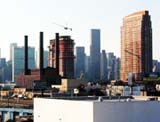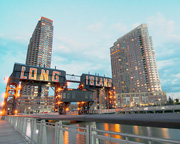Generally speaking, Queens has historically been neglected by tourists. In a Manhattan-centric city, Queens doesn't have neither the shock value The Bronx used to have nor the cool that Brooklyn is known for. It still carries its historical image of being a suburb for blue-collar workers in the 1950s.
Most people ignore how Queens went through the New York process of being galvanized by immigration and became a place where the little is remarkable and the mundane is special.

An odd situation developed in Queens in 2004. Hal Sirowitz, a writer who liked to be identified with the borough, finished his term as official poet laureate in Queens. Into itself, this fact was not particularly alarming. It's normal for poet laureates the retire -- it's one of those strange remnants America keeps of their English times centuries ago, as the English would have an in-house writer compose poems for the King since the times of Charles II. Since the U.S. had no monarchy, local writers composed poems for their local governments to be read in public events. They don't get paid and they don't get an office or anything. But they are there. In every locale. In every state. All over the country.
Except in Queens.
The requirements for the job are that the writer in question live in the area for no less than five years and must have composed poems about it.
In Queens, this amounted to nobody.
Most New York writers, it would seem, prefer to write about other things. Since Walt Whitman wrote about Brooklyn, others have followed suit. Manhattan doesn't have a single poet but dozens. Even The Bronx and Staten Island seem to have more powerful muses.

But Queens had, literally, no candidate to be their poet laureate. Some people did submit their poems for the committee, though. They had titles like "Christmas Week Depression," "Domestic Violence," and "I Read My Poems to My Dog." Another one had the following verse:
"There are five colleges
Traveling is easier
Living near two airports."
Is there something wrong with Queens, a largely residential area put on the map by the the World Fair in 1939? It did have some cultural life, after all. Walt Whitman was teacher there, but was fired because, as a Quaker, he wouldn't hit his students. Jack Kerouac started writing On the Road there in his mother's apartment. But, as the book's title suggests, he did not stay there for long. There is also Stephen Dunn, a Pultizer-prize winning poet who would seem perfect for the job. Only he's never written anything about Queens.
So what is it about Queens?

Queens is not a place known for its thinkers and its innovators. Its magic lies elsewhere. In how it easy it is to live everyday life in it.
It's the little things, the things that don't last and may not make it to history books, that make this borough special. This doesn't usually show up in travel guides. They will tell you that Queens was were vast cemeteries were built in the 19th century because the other boroughs had run out of places to bury their dead. The same with the factories. And the train cracks. And the highways to take the other citizens to Long Island. In the 20th century, seen from the outside, Queens was a blue-collar suburb at best.
But then the immigrants came. Queens became more cosmpolitan. Hipsters arrived to its ethnic food shops. Today, about 138 languages are spoken in it.
So what is it about Queens? The little, the incountable. The magic and uniqueness of its sights. The variety of its eateries. The things you find in the stores in Flushing. The things you will discover when you are there.
Queens is self-sufficent. Doesn't need any love from the outside so it never craves it. Which doesn't mean it doesn't deserve it. As Hal Sirowitz, the retired poet laureate, explain in one of his poems,
"So listen up you people of Manhattan.
You need us to keep your streets less crowded. We don't need you.
(PS.- He moved to Brooklyn after writing that)